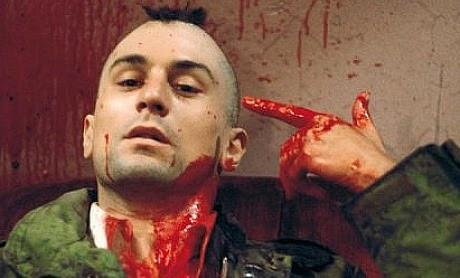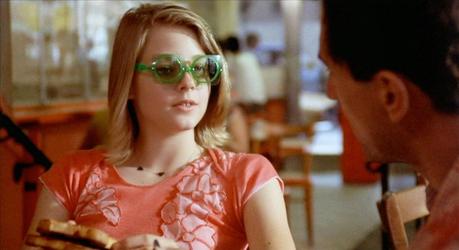 Even more than Goodfellas, Martin Scorsese's auteur status stands on Taxi Driver (1976). Bleak, violent and unsettling, it explores the thin line between hero and psychopath.
Even more than Goodfellas, Martin Scorsese's auteur status stands on Taxi Driver (1976). Bleak, violent and unsettling, it explores the thin line between hero and psychopath.Travis Bickle (Robert DeNiro) works as a New York City taxi driver. Travis grows increasingly disgusted by the depravity he witnesses every day, from casual crime to seedy sex. He flirts with Betsy (Cybill Shepherd), campaign worker for Senator Palantine (Leonard Harris), but sabotages their relationship. Unhinged, Travis buys an arsenal of firearms and begins stalking Ballantine. Yet a chance encounter with teen prostitute Iris (Jodie Foster) and her pimp Sport (Harvey Keitel) changes his mind.
Taxi Driver is a directorial tour de force. Scorsese crafts a gritty look that's less "realistic" than a living nightmare. Michael Chapman's bleak photography explores back alleys, grungy stores and Travis's semen-stained backseat, long takes interspersed with bracing close-ups. Bernard Herrman's score moody jazz riffs with monotonous, menacing undertones. Paul Schrader's strangely elliptical dialog reinforces the dream atmosphere. Self-consciously cinematic moments, like Travis contemplating a fizzy drink (an Odd Man Out homage?) or the desaturated shootout play into this, culminating in an ambiguous finale.
Scorsese casts New York as existential hell, putting other '70s crime dramas to shame. Street corners team with hookers and junkies, run-down liquor stores and porn theaters. Travis's buddies casually drop racial epithets while tough-looking blacks glower angrily. His passengers include hookers, johns and a psychopath (Martin Scorsese) burbling his own murder fantasies. One disturbing scene has Travis shooting a would-be robber - and the store owner beating the wounded hood with a tire iron. Iris and Sport's warped relationship seems tender in comparison.
Given this set-up, Taxi Driver could be another excursion into do-it-yourself crime fighting. Yet Scorsese and Schrader ruthlessly deconstruct the vigilante-as-hero narrative. Travis rants endlessly against the hookers, drugs and "queers" ruining society but is his brooding psychosis any better? After stalking Senator Palantine the whole film, he changes victims at the last minute and becomes a hero. Vigilantism channels the assassin's sick impulses towards more socially acceptable targets.

Critics like comparing Taxi Driver to The Searchers, mostly due to the Iris plot: Travis "saves" a victim who doesn't want it. But Travis is less Ethan Edwards than an American Meursualt: alienated, terminally bored, driven towards murder. Where Ethan's a relic of a bygone age, Travis fits in nowhere. He brushes shoulders with politicians and businessmen, criminals and prostitutes, even ordinary people but can't relate to anyone. Certainly he's self-destructive, whether taking Betsy to a porn film or chatting up a suspicious Secret Service agent. Violence is less a means than an end in itself.
Schrader based Travis on Arthur Bremer, who shot George Wallace in 1972 and left a rambling, demented diary (which clearly inspires Travis's narration). And the film notoriously inspired John Hinckley to shoot Ronald Reagan, in a bid to impress Jodie Foster. But Travis can stand in for a century of "lone nut" shooters, from Lee Harvey Oswald to Adam Lanza. These killers aren't driven by warped ideology or personal grievance, but some inscrutable madness - personal frustration, desire for notoriety. Taxi Driver probes this psychosis better than any other film.
Robert De Niro gives the performance of a lifetime. He plays Travis as a burn-out, his mischievous eyes and unsettling smirk hinting at inner madness. Wisely, De Niro doesn't ask us to sympathize with Travis: he's a creep and De Niro plays him that way. Neither does he resort to obvious tricks: no bellowing bug-outs or hammy monologues, just psychotic ramblings delivered in unsettling monotone. De Niro's control makes Travis's implosion all the more powerful.
Jodie Foster makes Iris the ultimate messed-up kid, wise-beyond-her-years sass hiding impenetrable confusion. Harvey Keitel counters with brusque, greasy charm. Cybill Shepherd is appealingly bland (or blandly appealing?) while Albert Brooks contributes light comic relief. Peter Boyle gets a show-stopping monolog as Travis's world-weary coworker. Joe Spinelli turns up momentarily as Travis's boss.
Taxi Driver rightly stands as a masterpiece. Scorsese made more ambitious and polished movies, but none have its bracing, visceral impact.

